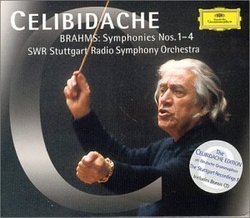| All Artists: Brahms, Sgro, Celibidache Title: Symphonies 1-4 Members Wishing: 0 Total Copies: 0 Label: Dg Imports Original Release Date: 1/1/1974 Re-Release Date: 2/1/1999 Album Type: Box set, Original recording remastered, Import Genre: Classical Style: Symphonies Number of Discs: 4 SwapaCD Credits: 4 UPC: 028945963525 |
Search - Brahms, Sgro, Celibidache :: Symphonies 1-4
 | Brahms, Sgro, Celibidache Symphonies 1-4 Genre: Classical
|
Larger Image |
CD Details |
CD ReviewsNot as good as the EMI set lampros | 06/18/2000 (4 out of 5 stars) "These are of course great performances of these symphonies, but IMO the EMI set with Celi and his Muncherner philarmoniker is absolutly unsurpassed. The Stuggart orchestra is not as good as the bavarian one, and the sound being good is not good enough for what Celibidache demmands. of course these performances being slow are not as radical and metaphysical as the ones from the late 80's and 90's." Brahms by the master! Santa Fe Listener | 05/30/2001 (5 out of 5 stars) "The only promlem here is, how do you choose between the EMI and DG Celibidache/Brahms symphony cycles? They are both amazing accounts of magical music making. I got them both!" Mid-Seventies Celibidache is more 'normal' and perhaps bette Santa Fe Listener | Santa Fe, NM USA | 09/02/2006 (5 out of 5 stars) "It's not right to typify a great musician with a simple tag, but it happens, and as a result Klemperer is known as 'slow' and Celibidache as 'slowest.' However, here in Stuttgart between 1974 and 1978, a decade ahead of the Brahms cycle released by EMI, the tempos are not eccentrically slow. They're on a par with Bernstein's later Brahms cycle from Vienna (also on DG), but in most movements about 2 min. faster than Celi in Munich. Your reaction will depend on whether you find this idiosyncratic maestro better when he's full tilt into his obsessions or only halfway there.
Personally, I like the DG cycle better in that it remains within hailing distance of Brahms' actual tempo indications. The readings are full of conviction, and Celibidache's rubato and highly musical phrasing stand out better when the ear isn't burdened by ultra-slow speeds. A good touchstone is the finale of Sym. #1, where many conductors miss the sense of mystery and anticipation that Brahms builds in the slow introduction. Celi handles it wonderfully, and when we get to the main Allegro, he conducts with plenty of inner life. There are times when the tempos are relatively alike in both the EMI and DG cycles. The Fourth Sym., which differs by only a minute per movement, shows up some stylistic differences. There's a surging accelerando in the first movement from Stuttgart that's gone in Munich. The finale of the Fourth has more tension in Stuttgart, too. But those who prefer the Munich orchestra and EMI's sonics are right. The Stuttgart radio orchestra is not as good, especially in the solo winds, and DG's sound is serviceable FM stereo, not the studio-quality sound one hears from Bavaria (although it, too, was taped in concert). Since I mostly care about interpretation, I had no trouble preferring the earlier DG cycle, but I can see how Celi's afficianados could come to the opposite conclusion." |

 Track Listings (4) - Disc #1
Track Listings (4) - Disc #1